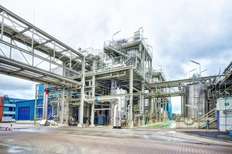- The new plant in Ibbenbüren, Germany, produces 120,000 metric tons of potassium hydroxide and 75,000 metric tons of chlorine annually.
- The facility uses state-of-the-art membrane electrolysis technology.
- The production process reduces the ecological footprint of chlorine by 25-30%.
- Evonik will convert part of the potassium hydroxide output into other products at its Lülsdorf site.

New Joint Venture Plant
AkzoNobel Specialty Chemicals and Evonik Industries have commenced production at their joint venture plant in Ibbenbüren, Germany. The facility employs advanced membrane electrolysis technology to produce up to 120,000 metric tons of potassium hydroxide and 75,000 metric tons of chlorine annually, along with hydrogen.
Production and Utilization
AkzoNobel will receive chlorine and hydrogen from the plant, while Evonik will market the potassium hydroxide and convert part of it at their Lülsdorf site into products like potassium carbonate, potassium bicarbonate, and potassium formate.
Environmental Impact
The new production process at the Ibbenbüren site will improve the ecological footprint of chlorine production by 25 to 30%, resulting in reduced energy consumption, lower costs, and fewer CO2 emissions.
Market Applications
Chlorine is crucial for manufacturing various products, including paper, disinfectants, medicines, and plastics used in construction, automotive, and electronics industries. Hydrogen has multiple applications, such as an energy carrier for upgrading fossil fuels and in ammonia production.

